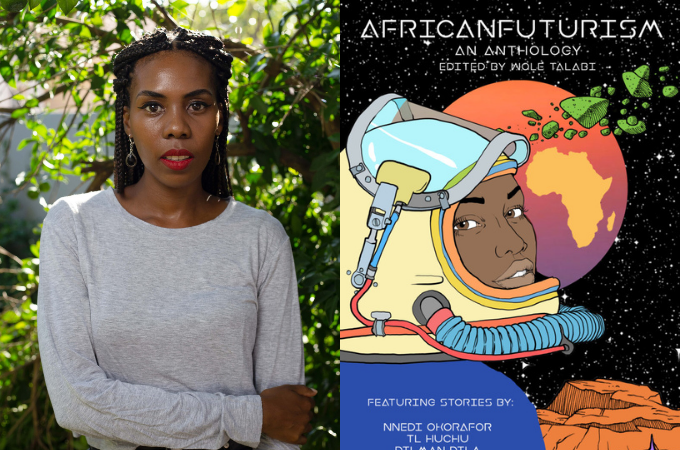
Hey Brittlepaperians, we have some good news. Motswana author Tlotlo Tsamaase’s “Behind Our Irises” wins the Nommo Award for Best Short Story. The story was published in Africanfuturism: The Anthology, a collection launched last year in celebration of Brittle Paper’s 10-year anniversary. She wins the award jointly with Innocent Chizaram Ilo for “Rat and Finch are Friends.”
The African Speculative Fiction Society shared the news on Twitter last week “Congratulations to the (tied) Nommo Award Winners for Best Short Story, including Tlotlo Tsamaase for Behind Our Irises.” The Nommo Awards are presented by the African Speculative Fiction Society to the best science fiction/fantasy works by African writers.
“Behind Our Irises” tells the story of a dystopian future in which a mega tech corporation mines the bodies of its African employees for data. It is one of 8 stories in the collection exploring the idea of Africanfuturism, a term coined by Okorafor to identify science fiction and fantasy that speaks to specifically African contexts.The collection was edited by Caine Prize finalist Wole Talabi and features writing by Nnedi Okorafor, TL Huchu, Dilman Dila, Rafeeat Aliyu, Mame Bougouma Diene, Mazi Nwonwu, and Derek Lubangakene.
Tsamaase is a Motswana writer. Her novella The Silence of the Wilting Skin was shortlisted for the Lambda Literary Award. Some of her publication credits include The Best of World SF Volume 1, Futuri uniti d’Africa, Clarkesworld, Terraform, and Strange Horizons.
This is the second major recognition for the anthology. The first took place earlier this year when the collection was made finalist for the Locus Awards. [See here if you missed it.] We are thrilled!
Congrats to Tsamaase!
Here is an excerpt of the story. Full story here and complete anthology here.
Each iris in the city bears the burning shades of autumn, ranging from light to dark.
Every eye in our firm runs surveillance programs behind its pupil. Connected through the authenticated enterprise cloud network to the central servers of the Firm. Able to detect corporate theft, infraction, abuse of work assets and more. Much more. I knew about the eyes but I only noticed the holes in our necks, stabbed into the jugular, into the carotid artery in that unsurveilled split second when my black pupils blinked silver and then back to black as the company automatically upgraded me. In that fraction of a second, when all their restraints loosened, I tried to scream.
I’d just started working for this fine establishment and I was on my third month of probation when it began. I was a graphic designer for a market research firm boasting a growing roster of foreign multinationals with tentacles steeped in every industry: manufacturing, agriculture, food industry, construction, health, technology, fashion, publishing, everything.
Before that I was unemployed for seven months living off my savings, so I hungrily signed the contract when they called me in after my interview. I was shocked that they could only offer me 3,000 pula, a salary that could barely cover my rent. How was I going to pay for transportation, utilities, groceries? They said they’d only review my salary at the end of the probation. I had to move out and find a squat room in Old Naledi that undergraduate students of a nearby university were using, which luckily was forty minutes’ walk from work, so I could make it without needing to catch a taxi-then-a-combi like I had to for my previous job.
The room I lived in was a compact space with only a shower and a two-plate stove in the entrance. Cold water, no heater. I lived cooped up in my house with no daylight and nature to water my stale growth. The windows looked out into walls and pit latrines. Dust swept itself in with flies from long-gone shit.









COMMENTS -
Reader Interactions